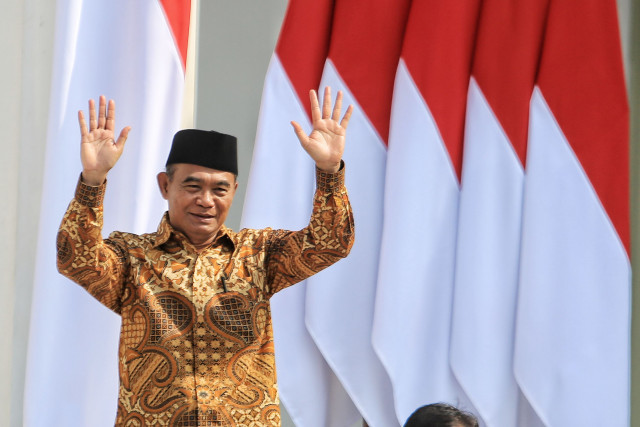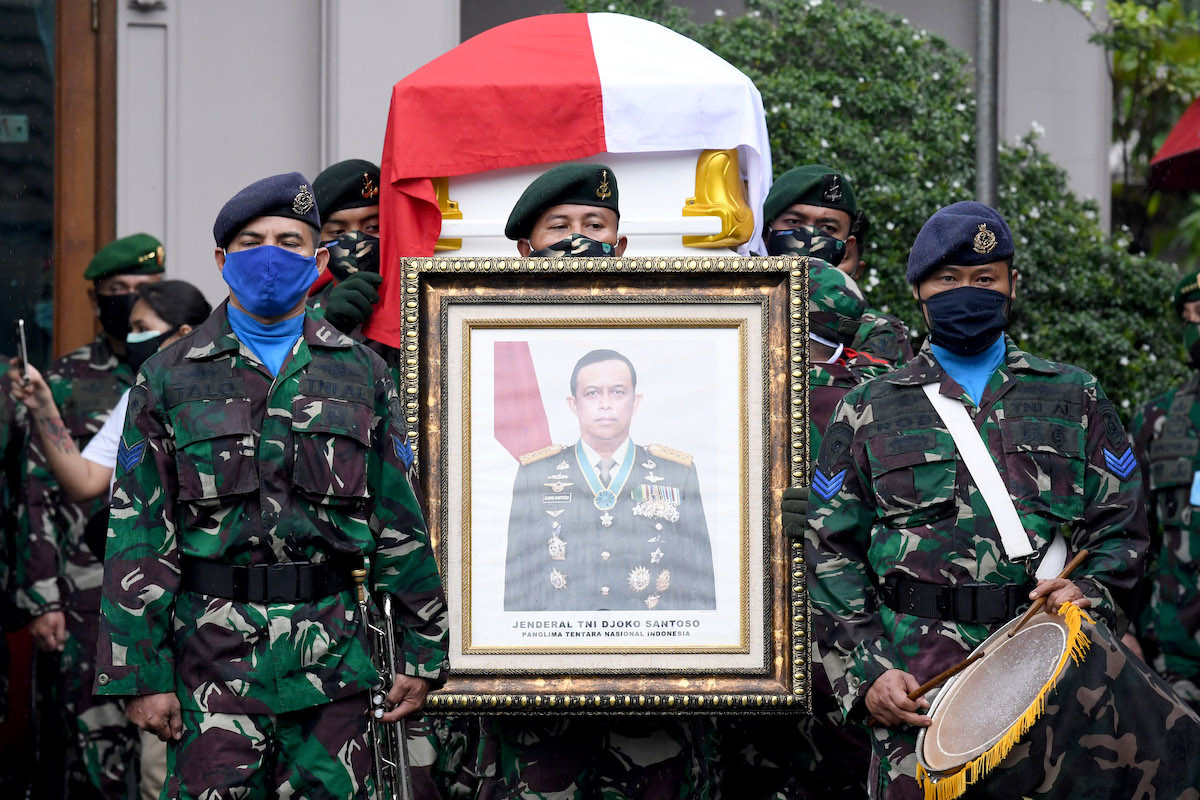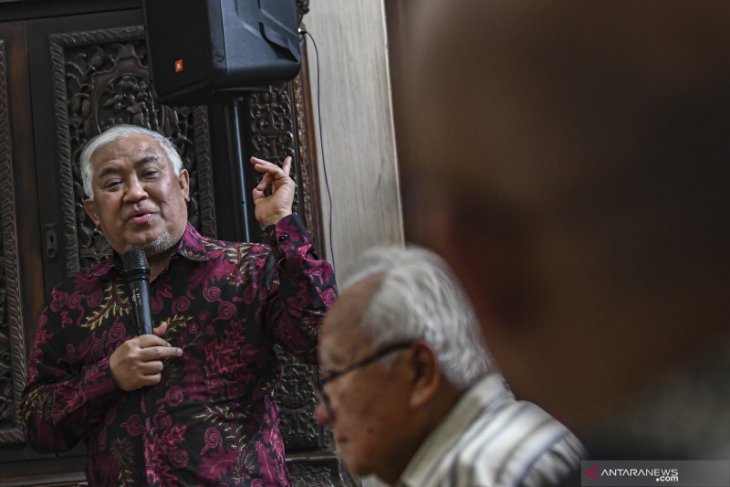Live Streaming
Program Highlight
Company Profile

Ani Hasanah
May
Indonesia’s COVID-19 Figures ‘Moderate’ Compared to ASEAN Countries: Minister
 Coordinating Human Development and Culture Minister Muhadjir Effendy (JP/Seto Wardhana)
Coordinating Human Development and Culture Minister Muhadjir Effendy (JP/Seto Wardhana)
Indonesian Coordinating Human Development and Culture Minister Muhadjir Effendy has claimed that Indonesia recorded only a moderate number of COVID-19 cases compared to other ASEAN countries and said the number continued to go down, dismissing Indonesia’s patchy testing capability and the highest death rate in the region.
“We’re on the right track. There is a decreasing trend of cases, though not dramatically. I thank all the people who have complied with the government’s COVID-19 precautionary measures,” Muhadjir said during a press briefing on Friday.
The statement came amid the government’s policy to ease travel restrictions and plans to gradually lift social restrictions in June.
On Saturday, Indonesia’s COVID-19 team reported the highest number of new cases in a single day, which was 533, bringing the total to 13,645 cases.
The data, critics and scientists have said, were not accurate because of Indonesia’s low testing capacity, which stood at fewer than 1,600 a day since March 3. As of Saturday noon, Indonesia has tested 108,669 people, which means it has conducted 0.39 tests per 1,000 people, one of the lowest test rates in the world.
Muhadjir considered the total number of confirmed cases “unexceptional” as Indonesia had a population of 273 million compared to the 6 million in Singapore, which recorded 22,460 cases as of Saturday.
He added that the country’s current growth rate of cases was not as extreme as in Europe or North America. According to the graph made by ourworldindata.org, starting in the fourth week after its first reported cases, the cases number in Indonesia doubles every five to seven days.
“We’re grateful that the exponential growth is not as rapid as predicted. The peak is at 500 cases a day,” he said, adding that the number of fatalities was plateauing as well and that all these data were used by the government as a guide to creating policies regarding COVID-19 handling in the near future.
Disease surveillance and biostatistics researcher at the Eijkman-Oxford Clinical Research Unit, Iqbal Ridzi Fahdri Elyazar, however, was skeptical about the government’s claims.
“The government is not looking at the right curve, the epi curve. They use analytical tools that are invalid, inaccurate, not trustworthy, and don’t meet the epidemiological standards in assessing the COVID-19 situation,” Iqbal told The Jakarta Post on Saturday.
According to the US Center for Disease Control and Prevention, an epidemic curve, or epi curve, is a visual display of the onset of illness to assess the distribution of cases over time. An epi curve shows the daily infection rate.
Indonesia had yet to have an epi curve and therefore, any claims of a decline in cases were not based on the right tool. What the government had been displaying was a curve showing the daily cases reported by the authorities, not the onset of infections, Iqbal said. The Health Ministry, he said, should have made epi curves to get a clearer picture of what was happening.
“To determine the onset of infections, a thorough epidemiology study should be done. But because it takes time and is costly, usually experts use other measures, such as the date when symptoms start showing, or the date when samples are taken, because some COVID-19 patients show no symptoms,” Iqbal told the Post.
The infection rate could not be determined by daily reported cases unless the test result came back positive for COVID-19 on the very day the people contracted the virus.
Meanwhile, the government has yet to reveal the average time gap between the sample collection and the test result. Some patients reported they had to wait for their test results for nine to 14 days, Kompas daily reported.
Wide testing is just as important in supporting the epi curve. Indonesia’s testing coverage is still very low with only 0.39 tests per 1000 people, far less than in neighboring Vietnam, which has conducted 2.68 tests per 1000 people, Singapore with 30.02 tests per 1000 people. Authorities in Iceland, meanwhile, have conducted 154.4 tests per 1000 people. (The Jakarta Post)
May
 Taman Safari Indonesia in Bogor, West Java, has welcomed a newborn male Sumatran elephant named Covid to its park. (Courtesy of Taman Safari Indonesia/--)
Taman Safari Indonesia in Bogor, West Java, has welcomed a newborn male Sumatran elephant named Covid to its park. (Courtesy of Taman Safari Indonesia/--)
Taman Safari Indonesia in Bogor, West Java, has welcomed a newborn male Sumatran elephant to its park.
The elephant calf, which was born in the park on April 28, was named Covid because he was born during the COVID-19 pandemic.
Sodik, an animal keeper at the park, said that Covid weighed 82.5 kilograms at birth. His parents are a 46-year-old female elephant named Nina and a 44-year-old male elephant named Kodir, both from Riau.
Other keepers who were also monitoring Covid's condition said that the elephant calf was lively and in good health.
Taman Safari Indonesia Bogor director Jansen Manansang said that Covid’s birth had brought the total number of elephants in the park to 51.
Taman Safari Indonesia is currently closed indefinitely because of the COVID-19 outbreak in the country. Zoos across Indonesia are struggling to make ends meet as a result of the lack of visitors.
A survey conducted by the Indonesian Zoo Association (PKBSI) last month showed that 92 percent of the association’s members in Sumatra, Java, Bali, Lombok, and Borneo – 55 zoos – had stock to feed their animals only until mid-May. (The Jakarta Post)
May

Soldiers carry the coffin and portrait of former Indonesian Military commander Gen. (Ret.) Djoko Santoso in a funeral procession in East Jakarta on Sunday. (Antara/M Risyal Hidayat)
Former Indonesian Military (TNI) commander Gen. (Ret.) Djoko Santoso died at the age of 67 on Sunday morning at the Gatot Subroto Army Hospital (RSPAD).
Gerindra Party politician Habiburokhman confirmed the death of his fellow party politician on Sunday.
“He died this morning, a few days after suffering a cerebral hemorrhage,” Habiburokhman said as quoted by kompas.com.
Djoko had been hospitalized since May 2 and underwent surgery for a cerebral hemorrhage the day after.
Born in Surakarta, Central Java on Sept. 8, 1952, Djoko was known as a prominent military figure.
He graduated from the Military Academy in 1975 and held various high-ranking positions in the army, including chief of the Pattimura Military Command in Maluku from 2002 to 2003 and chief of the Jayakarta Military Command in Jakarta in 2003.
He served as army chief of staff from 2005 to 2007, before being appointed as TNI commander by then-president Susilo Bambang Yudhoyono in 2007, a position he held until his retirement in 2010.
In 2015, he joined the Gerindra Party and was appointed deputy of the party’s steering committee. During the 2019 presidential election, Djoko Santoso chaired the Prabowo Subianto-Sandiaga Uno campaign team.
He is survived by his wife Angky Retno Yudianto and three children. (The Jakarta Post)
May
Government Urged to Thoroughly Investigate Indonesian Seafarers' Deaths

Indonesian Ulema Council (MUI) Advisory Council chairman Din Syamsuddin (ANTARA)
Chairman of the Indonesian Ulema Council (MUI)'s Advisory Council Din Syamsuddin expected that the government would thoroughly investigate the case of deaths of four Indonesian seafarers working for Chinese fishing vessels, of which three were buried at sea.
In a statement received in Jakarta on Sunday, Din said that in accordance with the mandate of the constitution to protect all the people of Indonesia, the government must investigate the case and file protests with those responsible for the recent deaths of the four Indonesian seafarers and the Chinese government which overshadows the ship where the crew was working.
Din described the burial of the three Indonesians at sea as an act against humanity. As a nation that adheres to the five principles of Pancasila on a fair and civilized principle, Indonesia should not leave it alone, he added.
"This is the time for us to show ourselves as a nation that holds fast to Pancasila, not in words but in real deeds," he said.
Indonesia’s Foreign Affairs Ministry will summon Chinese Ambassador to Indonesia Xiao Qian for clarification on treatment received by several Indonesians working for Chinese fishing vessels that ended in three of them dying.
The ministry will also seek the Chinese ambassador's explanation on the burial at sea of the bodies of the deceased Indonesian crew of Xin 629 and Long Xin 604 fishing boats, the ministry earlier noted in its statement received by ANTARA here on Thursday.
The Indonesian Foreign Ministry is keen to know whether the burial at sea of the deceased Indonesian workers had met the International Labour Organization (ILO) Seafarer's Service Regulations.
According to the ILO Seafarer's Service Regulations, a seafarer is buried at sea if "the death is caused by infectious disease and the deceased has been sterilized; and unable to keep the corpse for reasons of hygiene or the port of entry forbids vessels to keep cadavers or other legitimate reasons".
In December 2019 and March 2020, three Indonesians working for Long Xin 629 and Long Xin 604 had died while the fishing boats were sailing in the Pacific Ocean.
The fishing vessels' skippers expounded that they chose to bury the bodies of Indonesian crew members at sea since they died of infectious disease, and other crew members too concurred on conducting their burials at sea, the ministry stated.
The Indonesian Embassy in Beijing has sent a diplomatic note to the Chinese Foreign Ministry for clarification on this case.
The Chinese Foreign Ministry explained that the burials at sea were conducted in line with the practice of international maritime rules for the sake of the health of other crew members.
The Indonesian Foreign Ministry and related government agencies had summoned the seafarers' recruitment agencies to ensure that all normative rights of those Indonesian seafarers had been met.
The Indonesian Foreign Ministry had also informed the seafarers' families in Indonesia on their cases.
The Indonesian embassies in New Zealand, mainland China, and South Korea have been heedful of the problems faced by the Indonesian crew members of China's fishing boats Long Xin 605 dan Tian Yu 8 docked at Busan Port in South Korea several days ago.
Both Long Xin 605 and Tian Yu 8 had onboard 46 Indonesian crew members, of which 15 were from Long Xin 629.
The Indonesian Embassy in Seoul had coordinated with the South Korean authorities to repatriate 11 Indonesian crew members on April 24 and 14 others on May 8. The embassy is also attempting to send the coffin of a deceased Indonesian crew, identified as E. (ANTARA)

